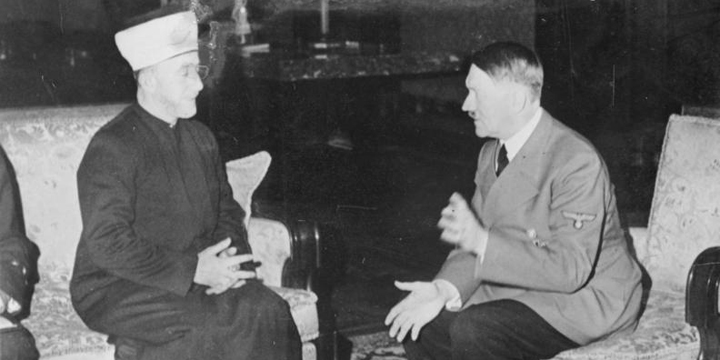Teaching the Holocaust in the Arab World has its Pitfalls
 by Lyn Julius / JNS.org
by Lyn Julius / JNS.org

The mufti of Jerusalem, Haj Amin al-Husseini, meets with Adolf Hitler in 1941. Photo: German Federal Archives via Wikimedia Commons.
JNS.org – Good news from the Gulf: The UAE will teach about the Holocaust in its schools. It is only right that in the ongoing process of normalization with Israel, the Gulf countries should make sure that schoolchildren are acquainted with the greatest catastrophe to befall the Jewish people.
But if teaching the Holocaust is meant to gain sympathy for Israel in the Arab world or even enhance the legitimacy of the Jewish state in Arab eyes, there are pitfalls to this approach.
One is that some supporters of the Palestinians misappropriate the Holocaust to draw a false comparison to the Palestinian nakba. The flight of some 700,000 Arabs from soon-to-be Israel, however, was not due to systemized mass murder, but rather the 1948 Arab-Israeli war.
Indeed, a more appropriate comparison would be between the Arab nakba and the Jewish nakba—the displacement of almost a million Jews from Arab countries, most of whom ended up in Israel in a de facto exchange of refugee populations.
The second danger is that teaching the Holocaust tends to portray antisemitism as a purely European phenomenon. It shifts the focus away from Arab and Muslim antisemitism, perpetuating the myth that Jews and Arabs had always lived in peace and harmony before Israel’s establishment.
As Matti Friedman put it, most Jews are in Israel because of the Arabs, not the Nazis. They arrived as refugees from riots, the Arab League’s Nuremberg-style discriminatory laws, arbitrary arrests, human rights abuses and forced dispossession.
The third danger is that Arabs could be misleadingly portrayed as “innocent bystanders” to the Holocaust who “paid the price” for a European problem through the creation of Israel.
The truth is that substantial numbers of Arabs were sympathetic to the Nazis, if only for the pragmatic reason that the Nazis were hostile to British and French colonialism. The Arab world was rife with paramilitary youth groups on the Nazi model, and Arab nationalist parties inspired by Nazism still exist today,
The fourth danger is that teaching the Holocaust will ignore active Arab collaboration with the Nazis, and the specific role played by the Palestinian Mufti of Jerusalem, Haj Amin Al-Husseini, the so-called “leader” of the Arab world.
The Mufti helped stage a pro-Nazi coup in Iraq in 1941 and incited the anti-Jewish massacre known as the Farhud, making no secret of his wish to exterminate the Jews in his sphere of influence. As Hitler’s guest in Berlin, the Mufti raised SS units of Muslim troops and broadcast poisonous anti-Jewish propaganda. For reasons of realpolitik, he was never tried at Nuremberg for war crimes, though he certainly could have been.
It is necessary to understand the connection, often erased for reasons of political correctness, between the Nazis, their Arab sympathizers and the Israeli-Palestinian conflict. The Mufti was, according to the scholar Matthias Kuentzel, the linchpin of the Nazis’ great war against the Jews and the Arabs’ small war against Israel.
Nazis fought alongside Arabs in the 1948 war and Nazis became military advisers to Gamal Abdel Nasser’s Egypt. In the 1950s, Islamized antisemitism, influenced by European ideas of Jewish conspiracy and control, became entrenched in the Muslim Brotherhood’s ideology.
Arab governments are no longer united in their desire to eliminate Israel, but there are still some who wish to complete the job Hitler started. Would “teaching the Holocaust” in this top-down fashion help weaken grassroots rejectionism? Isn’t it easier to sidestep the issue altogether?
Lyn Julius is the author of Uprooted: How 3,000 Years of Jewish Civilization in the Arab World Vanished Overnight (Vallentine Mitchell, 2018).
 Palestinian Prime Minister Announces New Reform Package
Palestinian Prime Minister Announces New Reform Package France: Man Suspected of Abducting, Raping Jewish Woman ‘to Avenge Palestine’
France: Man Suspected of Abducting, Raping Jewish Woman ‘to Avenge Palestine’ Israel Intensifies Strikes Across Gaza, Orders New Evacuations in North
Israel Intensifies Strikes Across Gaza, Orders New Evacuations in North Iran Threatens to Annihilate Israel Should It Launch a Major Attack
Iran Threatens to Annihilate Israel Should It Launch a Major Attack ‘Completely Baseless’: Reports of Mass Graves at Gaza Hospitals are False, IDF Says
‘Completely Baseless’: Reports of Mass Graves at Gaza Hospitals are False, IDF Says Columbia University Shutters Campus as Jews Fear for Safety, Critics Call for President to Resign
Columbia University Shutters Campus as Jews Fear for Safety, Critics Call for President to Resign ‘Hamas, We Love You!’ A List of the Chants, Statements From Columbia University’s ‘Gaza Solidarity Encampment’
‘Hamas, We Love You!’ A List of the Chants, Statements From Columbia University’s ‘Gaza Solidarity Encampment’ ‘Useless Pigs’: Anti-Israel Demonstrations Rage at Yale University, Forcing Police Intervention
‘Useless Pigs’: Anti-Israel Demonstrations Rage at Yale University, Forcing Police Intervention Anti-Israel Protesters Interrupt Chelsea Handler Comedy Show Because of Her Support for Jewish State
Anti-Israel Protesters Interrupt Chelsea Handler Comedy Show Because of Her Support for Jewish State Israeli Hostage Families Make Passover Plea for Return of Missing Loved Ones
Israeli Hostage Families Make Passover Plea for Return of Missing Loved Ones



 Israel Intensifies Strikes Across Gaza, Orders New Evacuations in North
Israel Intensifies Strikes Across Gaza, Orders New Evacuations in North France: Man Suspected of Abducting, Raping Jewish Woman ‘to Avenge Palestine’
France: Man Suspected of Abducting, Raping Jewish Woman ‘to Avenge Palestine’ Palestinian Prime Minister Announces New Reform Package
Palestinian Prime Minister Announces New Reform Package ‘Completely Baseless’: Reports of Mass Graves at Gaza Hospitals are False, IDF Says
‘Completely Baseless’: Reports of Mass Graves at Gaza Hospitals are False, IDF Says Iran Threatens to Annihilate Israel Should It Launch a Major Attack
Iran Threatens to Annihilate Israel Should It Launch a Major Attack